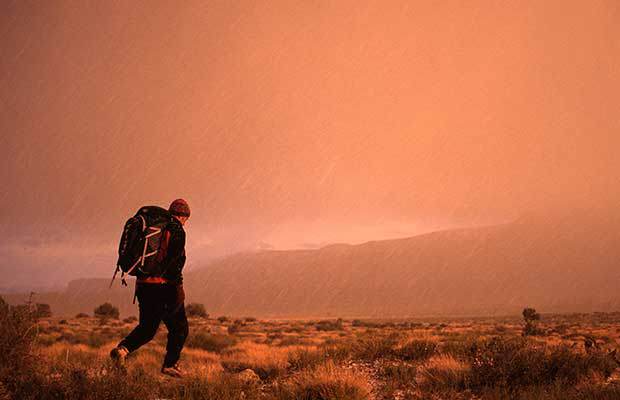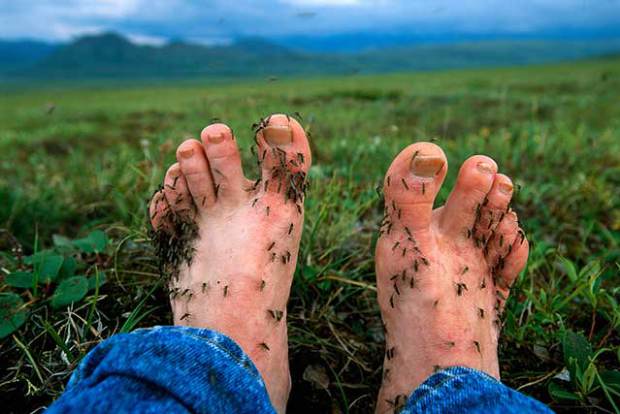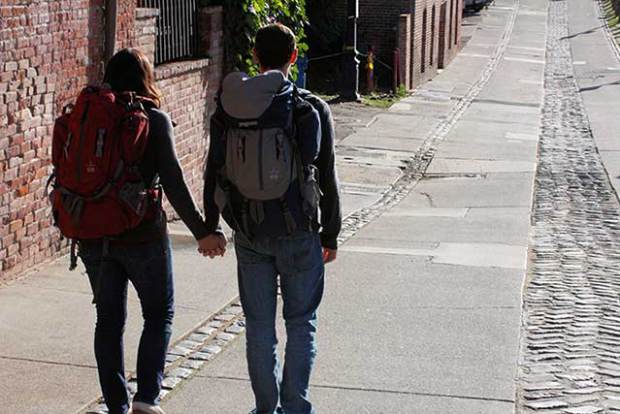The plan seems simple doesn’t it? All you need for the best chance of survival for your family is a well-stocked bug out bag, a keen attention to your surroundings and careful monitoring of what is happening in the news. With these bases covered you will be a very informed prepper and will be able to get the jump on all of the clueless sheeple if something bad happens. You will load your family up with your bags and hike off into the sunset way ahead of the approaching death and destruction. You have a plan to bug out.
It sounds perfect, but in this article I am going to try and convince you how that might not be the best and first option you should consider. There are many reasons and situations I can think of why you do not want to bug out from your home. You may be asking yourself, how can I even say those words on a prepper blog such as this without getting struck by lightning? It’s true that hunkering down is not the option that gets the most press, but in my opinion during most (but not all) scenarios, it is the better choice. That is unless you are a combat trained Navy Seal. If you are like me, just an average guy with a family and a giant subterranean monster unleashed by nuclear experiments is not headed your way, you might want to stay put. Here are a few reasons why:
You live where your stuff is.
I’ll be the first to admit that a lot of these reasons are going to seem incredibly simple and obvious, but I think sometimes that is the best way to approach a problem. As a prepper you have probably started collecting some supplies to help you get through short and long term emergencies. Some of you have stored a TON of supplies because you have been doing this for a long time or else you are independently wealthy and you just blew up the Black Friday sales.
Even if you only have a week’s worth of food and water, that is nothing to sneeze at. Everything you have is stored probably in nicely organized bins for easy retrieval. You don’t have to carry it and the supplies aren’t subject to the elements. Leaving your home will make you potentially have to leave most, or all of your survival supplies at home. You could put them all in your best bug out vehicle, the diesel Ford F-250 with the trailer, right? Sure you could, but are you sure that truck will always be in your possession? It’s just better to stay at your home base because there are tons of advantages like…
Even your kitchen floor is more comfortable than sleeping in the woods
Yes, I know that some people sleep perfectly well in the woods and I can too, once I am exhausted from hiking all day. Honestly, you would have to agree that your old lumpy Serta Posturpedic mattress would be preferable to sleeping in the woods or an abandoned building or even a hammock. Why is that important?
Getting plenty of good sleep has a huge impact on our health. It not only affects your moods, but alertness and even immune system. In a disaster you will be stressed in ways you haven’t even considered. You may be working like a dog and having a comfortable and relatively safe place to rest your head, even if that is the living room floor will be an advantage that the people who think they can just bug out into the woods won’t have.
Built in Community whether you know it or not
In times of crisis, you can almost guarantee that communities will band together in some ways. You probably don’t consider your small neighborhood or dead end street a community but let some disaster happen and you will see humans come together for support, safety and to help each-other out. Being around even just a few neighbors who know you can give you advantages if you need assistance for things like a neighborhood security plan.
Even neighbors you don’t get along with will probably overcome grudges if the disaster is severe enough. Of course there is the potential that your neighbors could turn on you for being the lone prepper but I think in most cases, things won’t go Mad Max for a little while. If it does you will have to adjust, but I believe that most people would benefit by banding with their neighbors for support. You could have an opportunity for leadership here or compassion by helping out others who haven’t prepared. It is much better to strive for this kind of relationship with people than head out the door and face the world with only what is on your back.
Being Cold Sucks and it can kill you
I bet that most of you like to keep the thermostat somewhere in the upper 60’s to low 70’s during the winter. There might be some play in that range, but there are no thermostats outside. Whatever the temperature is outdoors is what you are going to be living with. Can you start a fire or wear warm layers to regulate your body temperature? Of course, but the last place I want to be on a cold winter night is huddled up in my sleeping bag under a tarp even if I did have a nice roasting fire beside me.
There are some situations where you wouldn’t be able to start a fire. Maybe if it was raining and you couldn’t find any dry wood or tinder, or there were people that didn’t look so friendly following you. Staying in your home, even without power can give you advantages of shelter that you won’t easily find outdoors. You can seal off rooms and even your body heat will generate a little warmth. You can black out your curtains with heavy gauge plastic sheeting and even the heat from a lantern or a couple of candles can put out an amazing amount of heat.
You may put yourself in a worse situation
The problem with most bug out plans are that you don’t have a destination. Where are you bugging out to? Do you think the National Forest is going to be reserved solely for you and your family? Do you think you will just set up a tent and start hunting for small game? In a large regional disaster, there could be millions of people leaving the cities. The concept is called the Golden Horde and they will be competing with you for natural resources. With even a few dozen hunters in the same area game will be depleted in days if not sooner. Then you will be stuck near a bunch of other hungry people who blame you for catching the last squirrel.
Being on the road makes you an easier target
One of the advantages of staying put at home is the home field or defenders advantage. When you go out, you do not know what you are walking or driving into. The best you can do is recon very deliberately which will only slow you down more. By staying put in your home, you can set up a neighborhood watch with your fellow neighbors and monitor who is coming in. This gives you the opportunity to set up defensive positions and plans that anyone walking in with thoughts of taking advantage of you, won’t be aware of.
If nobody knows you, you are a stranger
Have you ever been walking your dog and seen someone strange walking through your neighborhood? This was someone you didn’t know so obviously they fell under suspicion. Had they been one of your neighbors kids you would have recognized them, but this new person stuck out. That is what you will be faced with if you leave your home and go wandering through other towns and cities. In your home neighborhood you will be dealing with known people that you can grow a deeper relationship with. There is a built-in level of trust because they have lived near you for years. If you start walking into a strange town with your bug out bags and AR-15 slung over your bulletproof vest, you may not like the attention you receive.
Gear is heavy and a lot of gear is heavier.
Speaking of walking around in your bulletproof vest and gear, how many of you have walked for 3 days with your bug out bag? OK, now add a full complement of bullets and anything else you think you might need to defend yourself. It adds up quickly even when you try to reduce the weight of your bug out bag as much as possible. These weren’t meant to live for a long time out of. Your food will run out, possibly your ammo and that will help you with the weight, but in a disaster where you are walking out the door in full combat gear, do you think Walmart will be open when you run out of something?
In a grid down you won’t get to call AAA
Maybe you are one of the lucky ones that have a place to go up in the mountains. If you don’t get out before everyone else starts leaving, you could be stuck on the road. What if your old bug out vehicle breaks down? All those supplies you stored in the back of that trailer are either going to feed a lot of other people on the highway or you will most likely die defending them. If you aren’t already living at your retreat before the disaster happens, you will have to be incredibly fast to avoid getting stranded. Let’s say you are ready to go, do you know when you would actually leave? Do you know when the S has actually HTF and it’s time to leave or will you debate leaving with your wife and mother for two days because they think it will all blow over soon?
If you get hurt you want to be near a secure shelter not under a tarp
I have a decent first aid supply kit. I don’t have IV’s and a ton of medicine but I can take care of garden variety injuries pretty well. Imagine you somehow break your leg after the grid is down. Would you rather drag yourself into the house, or be stuck in the woods for weeks unable to move? Most hospitals don’t stick their patients out in the back yard for a reason so you will convalesce better with a good roof over your head that is hopefully providing some climate protections. If nothing else, it will be a relatively clean and safe place to get better that beats lying under a log.
So what does staying home mean?
I will write a post about reasons why you may have to bug out later, but staying home doesn’t guarantee you will be safe and secure either. I think each situation has to be taken into consideration as to what is the better option for you and your family. Naturally if there is a fire heading your way staying at home is stupid. It is something to think about that and that may help you begin to form different plans for different scenarios. What are your plans?
If you found this article useful, please Vote for The Prepper Journal as a top prepper web site.
Copyright Information This information has been made available by The Prepper Journal. Content on this site (unless the work of a third-party) may be shared freely in digital form, in part or whole, for non-commercial use with a link back to this site crediting the author. All links in articles must remain intact as originally posted in order to be republished. If you would like to be notified of new articles, contests and Prepper news, please sign up for our daily newsletter.
by Pat Henry










